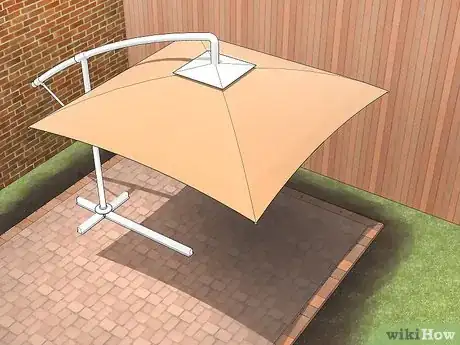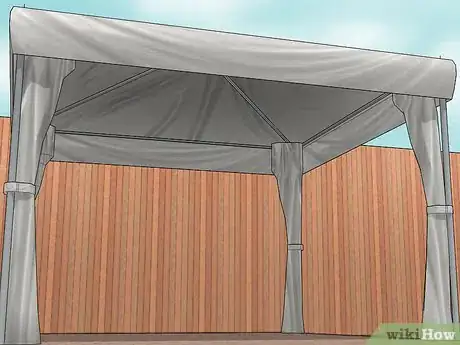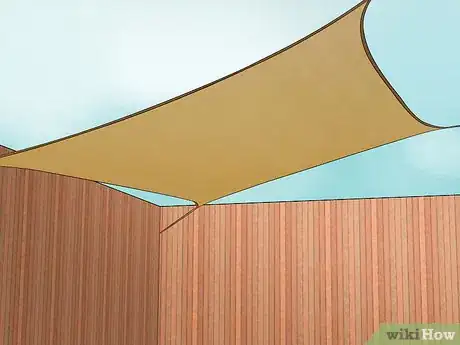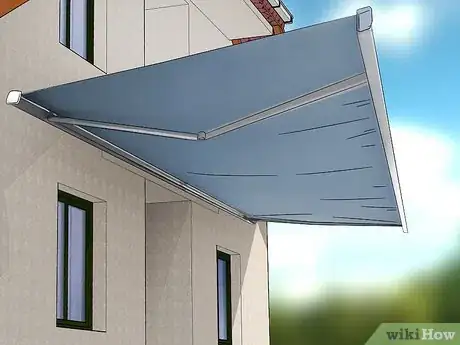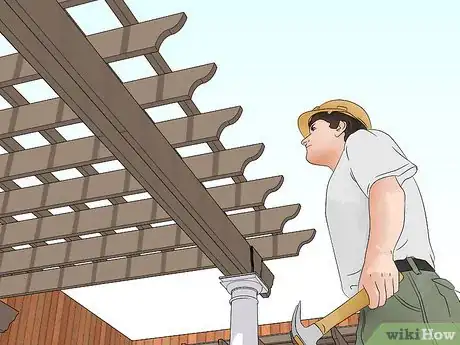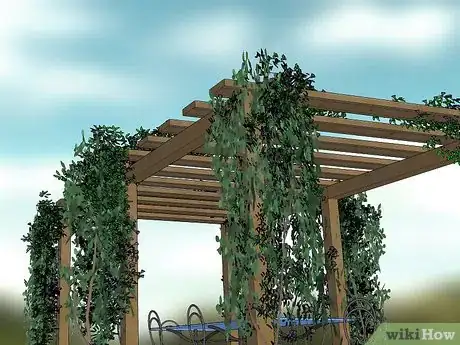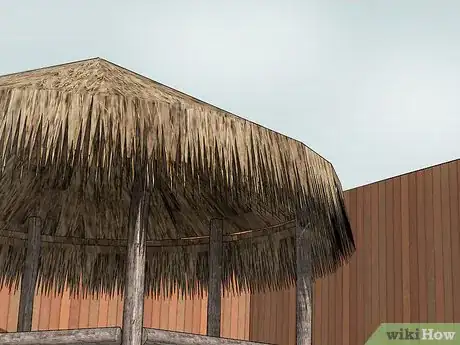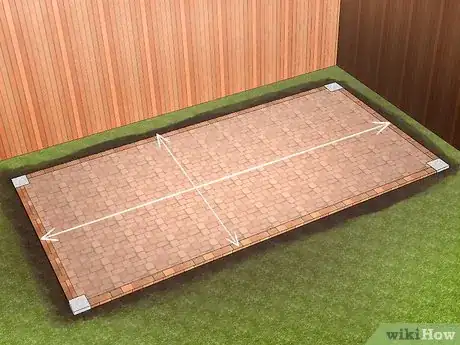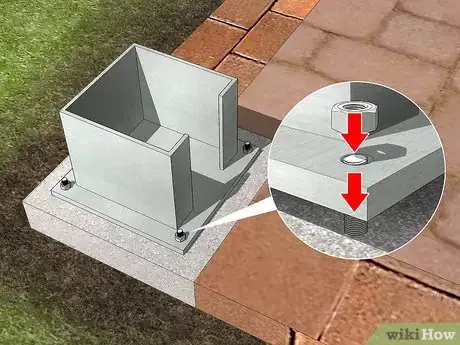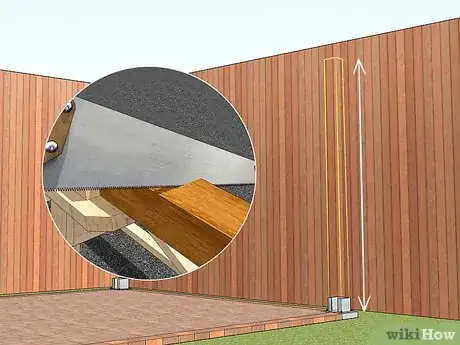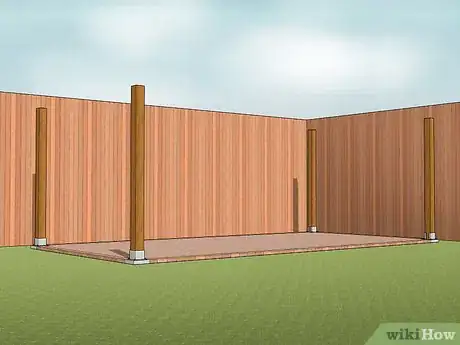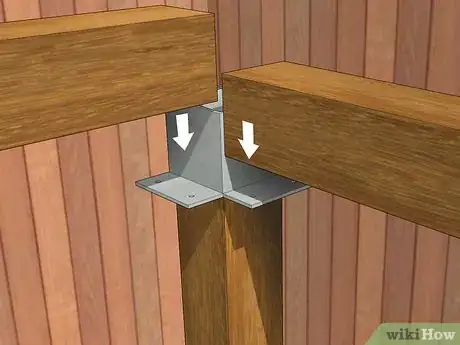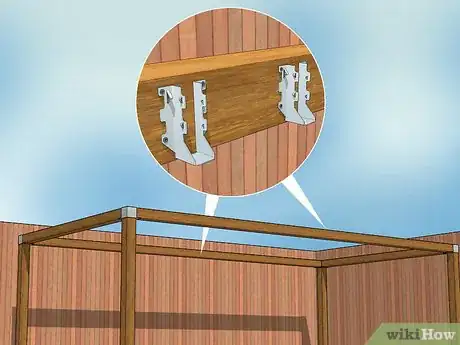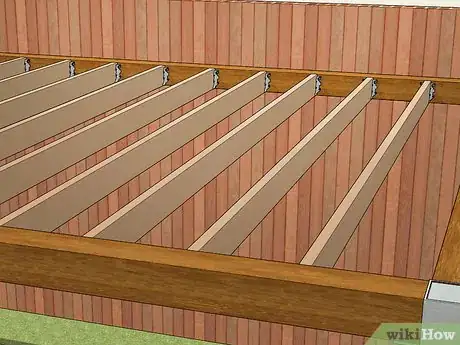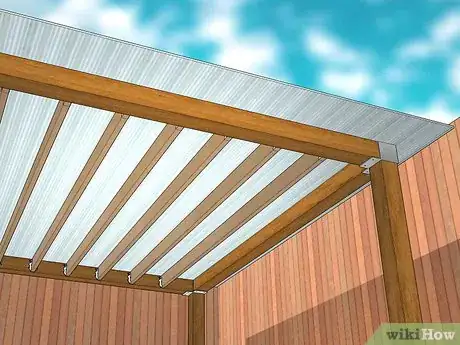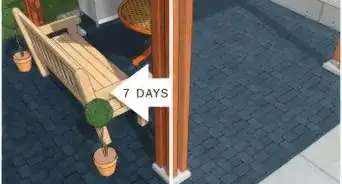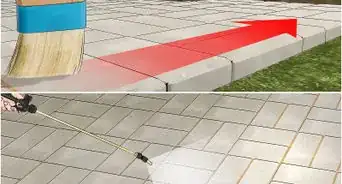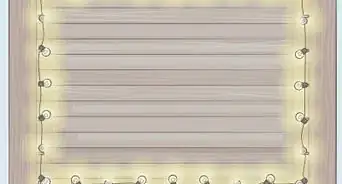This article was co-authored by Ryaan Tuttle. Ryaan Tuttle is a Home Improvement Specialist and the CEO of Best Handyman, Inc. in Boston, Massachusetts. With over 17 years of experience, he specializes in building home service businesses, focusing on creating scalable and efficient brands. With the help of his global team, the companies have achieved over 10+ million in sales and received recognition through magazine features, and enjoy partnerships with wikiHow and Jobber field service software. Boston Magazine and LocalBest.com have named Best Handyman Boston the Best Handyman in Boston. Ryaan holds Construction Supervisor and Home Improvement Contractor Licenses.
There are 8 references cited in this article, which can be found at the bottom of the page.
This article has been viewed 57,544 times.
A patio cover can be as simple as an umbrella to protect from sun and drizzle, or as complicated as a DIY wooden patio cover. Whether you want to make your patio a nice place to hang out with a bit of protection against sun and rain, or construct a patio cover to make it an extension of your home, there are a lot of options for you to get the job done. Choose an awning-style cover for a quick and economic option, get a patio cover professionally built to match your vision, or head down to your local home improvement center and pick up all the supplies to get building!
Steps
Installing Different Types of Patio Covers
-
1Purchase a patio umbrella for a cheap premade option that is easy to set up. This is the most basic and economic option to cover your patio. Get a patio umbrella that fits on your patio and is mobile so you can adjust it to block the sun as it moves, or shelter against light rain.[1]
- An advantage of patio umbrellas is that you can include them as part of an outdoor furniture set to complete your patio decor.
-
2Use some poles and a tarp or canvas to create an affordable outdoor canopy. Cover your patio with a tarp attached to 4 poles if it is located away from your home. Use only 2 poles and a tarp attached to the wall of your home (with hooks or loops set in the wall).[2]
- Get a tarp or canvas that already has grommets in the corners to easily tie it to the poles. Use a sturdy cord to tie everything together.
- You can use ropes and stakes, or buckets weighed down with sand or water, to secure the canopy in place. Stakes anchor the ropes that support the canopy's poles in place, or buckets act as weights to hold the rope and poles in place.
Advertisement -
3Buy a sail shade and tie it above your patio with the provided accessories. Look for secure points you can tie the sail shade to such as posts, trees, or secure parts of your home. Install wooden or steel posts at the corners of your patio if there are not enough existing points to tie the sail shade to.[3]
- If you do attach the sail shade to trees, this should be for temporary use only so you don’t damage the trees.
- If you choose to install wood or steel posts, you will have to dig holes to set them in. Concrete can provide a more secure foundation as well.
-
4Get a retractable awning professionally installed for a more versatile cover. Retractable awnings give you the option to cover and uncover your patio at will. Find a local retractable awning retailer in your area, choose a model that you like and that suits your budget, and have it installed over your patio.[4]
- Retractable awnings can either be solar-powered, remote control powered or hand-operated.
- Retractable awnings that are hand-operated are a slightly more affordable option than the motorized versions.
- Some models of retractable awnings have automatic sensors that deploy the awning when it is sunny out, and make them retract during bad weather that could damage them.
- Retractable awnings are usually attached to the side of your home over a patio, so you don’t need any kind of existing patio cover to install them.
-
5Hire a carpenter to build a patio cover for a permanent cover. Look up some local contractors in your area who build patio covers if you don’t have the experience to do it yourself. Get them to build an open wooden pergola, or a completely roofed patio cover.[5]
- A wooden pergola is essentially the base for any other patio cover. It is a structure over your patio that consists of wooden poles, beams, and rafters. It’s up to you whether to leave it open, or have it roofed over to provide more shelter or turn it into an extra outdoor room.
-
6Cover a wooden pergola with a trellis and vines for added shade and beauty. Nail a wooden trellis to the top of a pergola structure. Plant some vines around the bases of the corner posts and let them grow up the pergola and through the trellis.[6]
- You can also add some trellises to the sides of the pergola if you want to enclose it to add privacy and make it into more of a gazebo for your garden.
-
7Cover a wooden base with tiki thatching to add an island vibe to your patio. Choose natural tiki thatching if you live in a dry, hot, and windy climate. Choose synthetic thatching if you want less maintenance or live in a humid climate.[7]
- Keep in mind that synthetic thatch will be more expensive to install than natural thatch and usually doesn’t look as natural.
- Have your wooden patio base constructed out of natural looking logs instead of square lumber to go with the island vibe.
Building a Wooden Patio Cover
-
1Measure your patio and determine how high the patio cover will be. Use a tape measure to check the length and width of the patio you want to cover. Decide if you will create a free-standing cover or if you will attach it to your home at one side. Measure the height of the edge of the roof of your home if you will attach it there.[8]
- The patio cover can be any height you want if you are going to make a free-standing structure, but at least 7 ft (2.1 m) is a good standard height. If you are going to attach it to the edge of the roof of your home, then it will need to be lower than the gutters of the home’s roof.
-
2Install post mounts in each corner of the patio. Get 1 post mount for each corner, such as 6x6 post mounts, from a home improvement center or hardware store. Bolt them squarely into each corner of the patio where you will install a post.[9]
- Depending how big your patio cover will be, you can use smaller or larger posts. Ask at your local lumber yard what size of posts you should be using based on your patio dimensions to support the load of the cover.
-
3Cut the corner posts to the height of the patio cover that you want. Use a saw to cut the ends of the posts off to make them the height that you determined for your patio cover. Get the posts pre-cut to the size you need at a lumber yard or home improvement center if you don’t want to cut them yourself.[10]
- You can also cut a notch for the cross-beams you are going to install at this point. You will want to use a cross beam that is smaller than your posts. For example, if you are using 6x6 corner posts, then use a 4x6 crossbeam so that you can create a notch that it fits into. The notch should be at the top of the corner posts and the same dimensions as the crossbeam.
-
4Screw the corner posts to the post mounts. Set the corner posts in the post mounts and brace them in place, or have someone hold them. Use a drill to screw 3.5–4 in (8.9–10.2 cm) wood screws through every hole on the post mounts and into the posts.[11]
- You should have 4 corner posts if you are making a free-standing patio cover, and only 2 if you are attaching one side of the cover to your home.
-
5Install cross-beams on top of the corner posts. Set the cross-beams into the notches if you cut notches into the corner posts, or use metal cross-beam brackets to hold the beams in place. Use 3.5–4 in (8.9–10.2 cm) bolts or screws to secure the cross-beams into place in the notches or brackets.[12]
- You will only need 1 cross-beam if the patio cover will be attached to the side of your home.
-
6Screw joist hangers into the cross-beams. Joist hangers are metal brackets used to support rafters securely and easily. Screw joist hangers for whatever size of rafters you plan on using, such as 4x4 or 4x6, every 16 in (41 cm) along the cross-beams.[13]
- Screw a 2x4 or 2x6 along the whole length of the side of your home if you plan to attach the patio cover here. Screw joist hangers into this piece of wood opposite the cross-beam.
- You will need 2 joist hangers and 1 rafter for every 16 in (41 cm) of length of the patio cover.
-
7Nail the rafters you want to use to the joist hangers. Set the rafters you plan to use, normally 2x4s or 2x6s are good, into the joist hangers. Hammer 1.5 in (3.8 cm) nails in through the holes in the joist hangers to secure the rafters in place.[14]
- You can get all of your lumber pre-cut at a home improvement center or lumber yard to the lengths you need, or cut it at home if you have the experience and tools to do it.
-
8Install any kind of roofing you want, or leave the patio cover open. Leave the patio as is or cover it with a wooden trellis if you just want to create a bit of shade or let vines grow on it. Cover it with any kind of solid roofing, such as plywood and shingle or corrugated plastic roofing, if you want a more protective shelter.[15]
- You can match the roofing to the roofing on your home, if you attached the patio cover to the side of it, in order to make it appear as just an extension of the home’s roof.
Things You’ll Need
Building a Wooden Patio Cover
- Measuring tape
- 2-4 corner posts
- 1-2 cross-beams
- Rafters (1 for every 16 in (41 cm))
- Joist holders
- Post mounts
- 3.5–4 in (8.9–10.2 cm) screws
- 1.5 in (3.8 cm) nails
- 3.5–4 in (8.9–10.2 cm) bolts
- Roofing materials (optional)
- Saw
- Hammer
- Drill
References
- ↑ https://www.dreamstyleremodeling.com/patio-cover-buying-guide-what-essentials-do-you-need-to-know/
- ↑ https://lifehacker.com/create-your-own-cheap-weather-shielding-outdoor-canopy-5556566
- ↑ https://www.coolaroo.com/diy-hub/how-to-install-your-coolaroo-shade-sail
- ↑ https://www.nytimes.com/2007/07/15/realestate/15home.html
- ↑ https://www.dreamstyleremodeling.com/patio-cover-buying-guide-what-essentials-do-you-need-to-know/
- ↑ https://www.bhg.com/home-improvement/outdoor/pergola-arbor-trellis/pergolas-with-seating/
- ↑ https://www.landscapingnetwork.com/pergolas/tiki-hut.html
- ↑ https://www.mycarpentry.com/patio-cover-plans.html
- ↑ https://www.mycarpentry.com/patio-cover-plans.html
- ↑ https://wilkerdos.com/2016/11/how-to-build-patio-cover/
- ↑ https://wilkerdos.com/2016/11/how-to-build-patio-cover/
- ↑ https://wilkerdos.com/2016/11/how-to-build-patio-cover/
- ↑ https://wilkerdos.com/2016/11/how-to-build-patio-cover/
- ↑ https://wilkerdos.com/2016/11/how-to-build-patio-cover/
- ↑ https://wilkerdos.com/2016/11/how-to-build-patio-cover/
